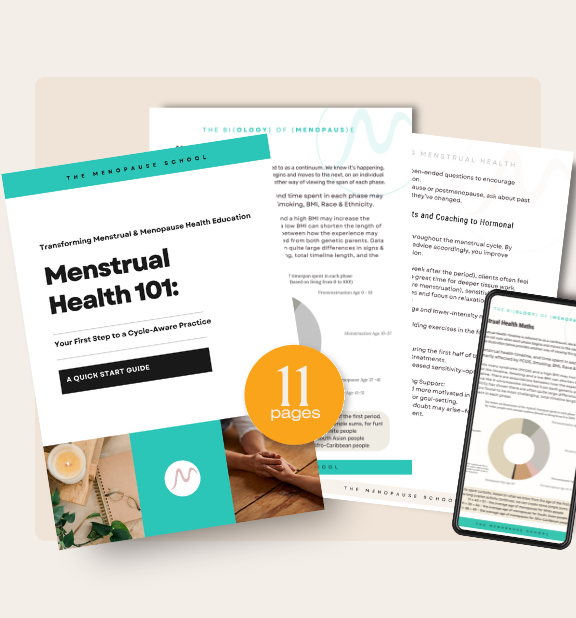Articles & Information
BLOG

What is Menstrual Health?
Menstrual health refers to, “a state of complete physical, mental, and social well-being and not merely the absence of disease or infirmity, in relation to the menstrual cycle”
Introduction:
Understanding and tracking the menstrual cycle is vital for anyone who menstruates. Menstrual health, often regarded as the fifth vital sign, provides critical insights into overall health across a person’s lifespan. This concept underscores the importance of knowing what the body is saying, from the onset of menstruation through to postmenopause.
The trick is learning to fully engage with the lingo, like a native, not a tourist.

Next to blood pressure, respiration rate, heart rate and body temperature, Menstrual Health is like the 5th Vital Sign
The Menstrual Health Timeline
The journey from the first period to postmenopause is known as the menstrual health timeline. This continuum involves various stages, each characterized by different hormonal shifts and health implications. Being familiar with this timeline can provide clarity and peace of mind, helping to navigate each phase with confidence.
Why Menstrual Health Tracking Matters
1. Health Monitoring: Just like checking your pulse or blood pressure, tracking your menstrual cycle helps monitor your health. Irregularities or changes in your cycle can explain many signs such as sudden tiredness for no apparent reason, headaches, and difficulty sleeping. Becoming aware early on that these health fluctuations may be related to the cycle allows for small, timely changes to the way of eating, moving, and resting.
2. Understanding Ovulation: Ovulation is a key phase in the menstrual cycle, essential for overall hormonal balance. Regular ovulation indicates that the body is producing the necessary hormones in the right proportions, contributing to bone health, cardiovascular health, and emotional well-being.
3. Informed Choices: Knowledge about the menstrual cycle empowers individuals to make informed decisions about their health. Awareness of ovulatory versus anovulatory periods can help in planning for pregnancy or managing contraception. Additionally, understanding the cycle aids in anticipating and managing premenstrual symptoms, reducing stress and improving quality of life.
Menstrual Health as the 5th Vital Sign
The American College of Obstetricians and Gynecologists (ACOG) has described menstrual health as a vital sign, akin to heart rate or blood pressure. This comparison highlights the menstrual cycle’s role in indicating overall health. Regular, healthy menstrual cycles reflect a well-functioning endocrine system, which regulates hormones impacting almost every aspect of health.
Benefits of Understanding the Menstrual Health Timeline
1. Clarity and Calm: Understanding the menstrual health timeline helps demystify the changes the body undergoes, reducing anxiety and fostering a sense of calm. Knowing what to expect at different stages—from menstruation to perimenopause and beyond—enables preparation and proactive responses.
2. Increased Body Confidence: Familiarity with the menstrual cycle, the literacy and its phases can enhance body confidence. Understanding the reasons behind certain bodily behaviors can lead to a better appreciation of its functions and a greater sense of control.
3. Holistic Health Management: Menstrual health doesn’t exist in isolation. Hormones interact with various bodily systems, and menstrual health is intertwined with factors like stress, nutrition, sleep, breathing, and movement. For instance, high-stress levels can disrupt the cycle, poor nutrition can impact hormone production, and adequate sleep is crucial for hormonal regulation.
Empowering Choices Before Perimenopause
It is crucial to educate everyone about their menstrual health well before reaching perimenopause. Perimenopause, the transitional period leading to menopause day, involves significant hormonal shifts that can impact physical and emotional health. Being informed about menstrual health allows for better navigation of this transition, making empowered decisions regarding nutrition, movement, lifestyle adjustments, and healthcare interventions.
Conclusions
Menstrual cycle tracking and understanding the importance of ovulation are essential for maintaining optimal health. Recognizing menstrual health as the fifth vital sign emphasises its significance across the lifespan. By understanding the menstrual health timeline, individuals can achieve clarity, reduce anxiety, and enhance body confidence. This knowledge is empowering, enabling informed choices about hormone health and the interplay of various factors like stress, nutrients, sleep, breathing, and movement. Educating oneself before perimenopause ensures better preparation for this phase and maintains overall well-being.

What is Menstrual Health?
Menstrual health refers to, “a state of complete physical, mental, and social well-being and not merely the absence of disease or infirmity, in relation to the menstrual cycle”
Introduction:
Understanding and tracking the menstrual cycle is vital for anyone who menstruates. Menstrual health, often regarded as the fifth vital sign, provides critical insights into overall health across a person’s lifespan. This concept underscores the importance of knowing what the body is saying, from the onset of menstruation through to postmenopause.
The trick is learning to fully engage with the lingo, like a native, not a tourist.

Next to blood pressure, respiration rate, heart rate and body temperature, Menstrual Health is like the 5th Vital Sign
The Menstrual Health Timeline
The journey from the first period to postmenopause is known as the menstrual health timeline. This continuum involves various stages, each characterized by different hormonal shifts and health implications. Being familiar with this timeline can provide clarity and peace of mind, helping to navigate each phase with confidence.
Why Menstrual Health Tracking Matters
1. Health Monitoring: Just like checking your pulse or blood pressure, tracking your menstrual cycle helps monitor your health. Irregularities or changes in your cycle can explain many signs such as sudden tiredness for no apparent reason, headaches, and difficulty sleeping. Becoming aware early on that these health fluctuations may be related to the cycle allows for small, timely changes to the way of eating, moving, and resting.
2. Understanding Ovulation: Ovulation is a key phase in the menstrual cycle, essential for overall hormonal balance. Regular ovulation indicates that the body is producing the necessary hormones in the right proportions, contributing to bone health, cardiovascular health, and emotional well-being.
3. Informed Choices: Knowledge about the menstrual cycle empowers individuals to make informed decisions about their health. Awareness of ovulatory versus anovulatory periods can help in planning for pregnancy or managing contraception. Additionally, understanding the cycle aids in anticipating and managing premenstrual symptoms, reducing stress and improving quality of life.
Menstrual Health as the 5th Vital Sign
The American College of Obstetricians and Gynecologists (ACOG) has described menstrual health as a vital sign, akin to heart rate or blood pressure. This comparison highlights the menstrual cycle’s role in indicating overall health. Regular, healthy menstrual cycles reflect a well-functioning endocrine system, which regulates hormones impacting almost every aspect of health.
Benefits of Understanding the Menstrual Health Timeline
1. Clarity and Calm: Understanding the menstrual health timeline helps demystify the changes the body undergoes, reducing anxiety and fostering a sense of calm. Knowing what to expect at different stages—from menstruation to perimenopause and beyond—enables preparation and proactive responses.
2. Increased Body Confidence: Familiarity with the menstrual cycle, the literacy and its phases can enhance body confidence. Understanding the reasons behind certain bodily behaviors can lead to a better appreciation of its functions and a greater sense of control.
3. Holistic Health Management: Menstrual health doesn’t exist in isolation. Hormones interact with various bodily systems, and menstrual health is intertwined with factors like stress, nutrition, sleep, breathing, and movement. For instance, high-stress levels can disrupt the cycle, poor nutrition can impact hormone production, and adequate sleep is crucial for hormonal regulation.
Empowering Choices Before Perimenopause
It is crucial to educate everyone about their menstrual health well before reaching perimenopause. Perimenopause, the transitional period leading to menopause day, involves significant hormonal shifts that can impact physical and emotional health. Being informed about menstrual health allows for better navigation of this transition, making empowered decisions regarding nutrition, movement, lifestyle adjustments, and healthcare interventions.
Conclusions
Menstrual cycle tracking and understanding the importance of ovulation are essential for maintaining optimal health. Recognizing menstrual health as the fifth vital sign emphasises its significance across the lifespan. By understanding the menstrual health timeline, individuals can achieve clarity, reduce anxiety, and enhance body confidence. This knowledge is empowering, enabling informed choices about hormone health and the interplay of various factors like stress, nutrients, sleep, breathing, and movement. Educating oneself before perimenopause ensures better preparation for this phase and maintains overall well-being.

What is Menstrual Health?
Menstrual health refers to, “a state of complete physical, mental, and social well-being and not merely the absence of disease or infirmity, in relation to the menstrual cycle”
Introduction:
Understanding and tracking the menstrual cycle is vital for anyone who menstruates. Menstrual health, often regarded as the fifth vital sign, provides critical insights into overall health across a person’s lifespan. This concept underscores the importance of knowing what the body is saying, from the onset of menstruation through to postmenopause.
The trick is learning to fully engage with the lingo, like a native, not a tourist.

Next to blood pressure, respiration rate, heart rate and body temperature, Menstrual Health is like the 5th Vital Sign
The Menstrual Health Timeline
The journey from the first period to postmenopause is known as the menstrual health timeline. This continuum involves various stages, each characterized by different hormonal shifts and health implications. Being familiar with this timeline can provide clarity and peace of mind, helping to navigate each phase with confidence.
Why Menstrual Health Tracking Matters
1. Health Monitoring: Just like checking your pulse or blood pressure, tracking your menstrual cycle helps monitor your health. Irregularities or changes in your cycle can explain many signs such as sudden tiredness for no apparent reason, headaches, and difficulty sleeping. Becoming aware early on that these health fluctuations may be related to the cycle allows for small, timely changes to the way of eating, moving, and resting.
2. Understanding Ovulation: Ovulation is a key phase in the menstrual cycle, essential for overall hormonal balance. Regular ovulation indicates that the body is producing the necessary hormones in the right proportions, contributing to bone health, cardiovascular health, and emotional well-being.
3. Informed Choices: Knowledge about the menstrual cycle empowers individuals to make informed decisions about their health. Awareness of ovulatory versus anovulatory periods can help in planning for pregnancy or managing contraception. Additionally, understanding the cycle aids in anticipating and managing premenstrual symptoms, reducing stress and improving quality of life.
Menstrual Health as the 5th Vital Sign
The American College of Obstetricians and Gynecologists (ACOG) has described menstrual health as a vital sign, akin to heart rate or blood pressure. This comparison highlights the menstrual cycle’s role in indicating overall health. Regular, healthy menstrual cycles reflect a well-functioning endocrine system, which regulates hormones impacting almost every aspect of health.
Benefits of Understanding the Menstrual Health Timeline
1. Clarity and Calm: Understanding the menstrual health timeline helps demystify the changes the body undergoes, reducing anxiety and fostering a sense of calm. Knowing what to expect at different stages—from menstruation to perimenopause and beyond—enables preparation and proactive responses.
2. Increased Body Confidence: Familiarity with the menstrual cycle, the literacy and its phases can enhance body confidence. Understanding the reasons behind certain bodily behaviors can lead to a better appreciation of its functions and a greater sense of control.
3. Holistic Health Management: Menstrual health doesn’t exist in isolation. Hormones interact with various bodily systems, and menstrual health is intertwined with factors like stress, nutrition, sleep, breathing, and movement. For instance, high-stress levels can disrupt the cycle, poor nutrition can impact hormone production, and adequate sleep is crucial for hormonal regulation.
Empowering Choices Before Perimenopause
It is crucial to educate everyone about their menstrual health well before reaching perimenopause. Perimenopause, the transitional period leading to menopause day, involves significant hormonal shifts that can impact physical and emotional health. Being informed about menstrual health allows for better navigation of this transition, making empowered decisions regarding nutrition, movement, lifestyle adjustments, and healthcare interventions.
Conclusions
Menstrual cycle tracking and understanding the importance of ovulation are essential for maintaining optimal health. Recognizing menstrual health as the fifth vital sign emphasises its significance across the lifespan. By understanding the menstrual health timeline, individuals can achieve clarity, reduce anxiety, and enhance body confidence. This knowledge is empowering, enabling informed choices about hormone health and the interplay of various factors like stress, nutrients, sleep, breathing, and movement. Educating oneself before perimenopause ensures better preparation for this phase and maintains overall well-being.
a free practitioner's guide
Menstrual Health 101
Key insights
Your First Step to a Cycle-Aware Practice

Start making a real impact today.

Why You Need This Guide
Explore how hormonal rhythms influence metabolism, mood, and well-being at every life stage
Discover how small, practical shifts in your approach can enhance client outcomes, build trust, and set you apart in your field.


